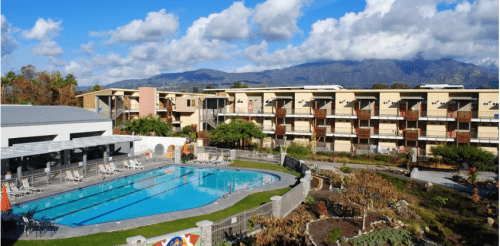New Student Housing
MCR Housing
Welcome to Pitzer College Residence Life!
This page serves incoming New Students (first time first year, transfer, and exchange) seeking resources concerning all things Residence Life at Pitzer. Please use this page as a dynamic resource as you navigate Housing Applications, Roommate Matching, Move-In, and your first few weeks living in the Pitzer residential community.
FAQ – Housing Application, Room Assignments and Moving In
MCR Housing is the online platform, accessible via the student portal, in which New Students apply for housing and provide Residence Life additional information used for roommate matching and room assignments. After admitted students have committed to attending Pitzer, New Students will be able to use their Single Sign On (SSO) to log in to their student portal, access MCR Housing, and complete their New Student Housing Application. You will have between June 2nd - June 30th to complete your application on MCR Housing.
The New Student Housing Process uses MCR Housing for the following functions:
Step 1 Fill out a Housing Application (Required for all students) – Residence Life will use your Fall 25 housing application to collect information regarding housing assignments, residential agreements, roommates, and meal plans.
Step 2 Roommate Matching (Optional) – Once you have filled out your housing application, you can create a profile on MCR which will be used to identify compatible roommates within your class. To secure a roommate match, send a friend request to the student you would like to match with. They will need to verify the match on their end of the portal. You can also create a profile and choose to have the MCR algorithm match you with a roommate based on your answers.
Please watch this video tutorial to learn about roommate matching
New Students Housing Timeline
- Housing Application (for new students in fall) – June2nd - July 1st, 2025
- Complete ONE of the following applications in your MCR Portal
- Fall 25 First Year Housing Application
- Off-Campus Housing Application
- First Years must have accommodations to live off-campus
- Transfer Housing Application
- Complete ONE of the following applications in your MCR Portal
- Housing Accommodations Deadline- June 24th
- Students who require housing accommodations must submit their application along with medical documentation via this link: Online Housing Application - DSV4-LionHead
- Students can read more about their eligibility for housing accommodations here: Requesting Housing Accommodations | Pitzer College
- Complete Roommate Matching by June 30th , 2025.
- First Year Virtual Roommate Mixer
- Meet members of the ResLife community along with your future classmates via zoom. This allows first-year students the opportunity to mingle with potential roommates and discuss compatibility.
- Tuesday June 10th 1pm-2:30pm (PST)
- Zoom Link: https://pitzer.zoom.us/j/83697363260?from=addon
- Meeting ID: 836 9736 3260
- Thursday June 19th 1pm-2:30pm (PST)
- Zoom Link: https://pitzer.zoom.us/j/81518476570?from=addon
- Meeting ID: 815 1847 6570
- Tuesday June 10th 1pm-2:30pm (PST)
- Meet members of the ResLife community along with your future classmates via zoom. This allows first-year students the opportunity to mingle with potential roommates and discuss compatibility.
- Room Assignments will be posted to the MCR Housing Portal– Mid-July 2025
The New Student Housing Application will contain the following parts:
- Name/email (pre-loaded)
- Choose a Meal Plan
- Roommate Matching Questionnaire
- Majority of roommate matching information
- Take your time to complete accurately, try to predict your college lifestyle!
- Viewable by other students
- Residence Hall Agreement to abide by policies
- All students living in the residence halls are required to commit to a meal plan on their Housing Application.
Meal Plan Options:
5 Meal Plan (Pitzer@CCA and Commuters Only)
12 Meal Plan + $120 Flex
14 Meal Plan + $140 Flex
16 Meal Plan + $160 Flex
19 Meal Plan + $190 Flex
- Zero Meal Plan (Commuters Only)
- Please note that meal plans are only active when classes are in session. Financial aid is calculated based on the 19 meal plan.
- The last day to decrease your meal plan selection is August 11, 2025. You may not decrease your meal plan after this date.
- Meal plans can be increased at any point in the semester.
- Students who may need a medical accommodation for a 5 or 0 meal plan based on dietary restrictions will need to submit documentation through an accommodations application: Online Housing Application - DSV4-LionHead
- For more information about McConnell Dining Hall visit https://connect.pitzer.edu/portal/adventure?cmd=mcconnell
Roommate and Suitemates Assigned
For students that choose not to make a 2-person Roommate Group, MCR software will review information provided in the Roommates and Rooms section of your MCR portal. It is important that students complete these fields with information that is accurate to how they predict they will live in college.
- Roommate and Suitemate gender preferences
- Level of cleanliness
- Smoking practices
- Wake/Sleep up schedule
- Expectations of friendship with roommate
- Social hosting preferences
Room Assignments
After roommates and suitemates are matched (either self-selected or by the MCR Housing Algorithm), students will be able to log on to MCR Housing to see assignments.